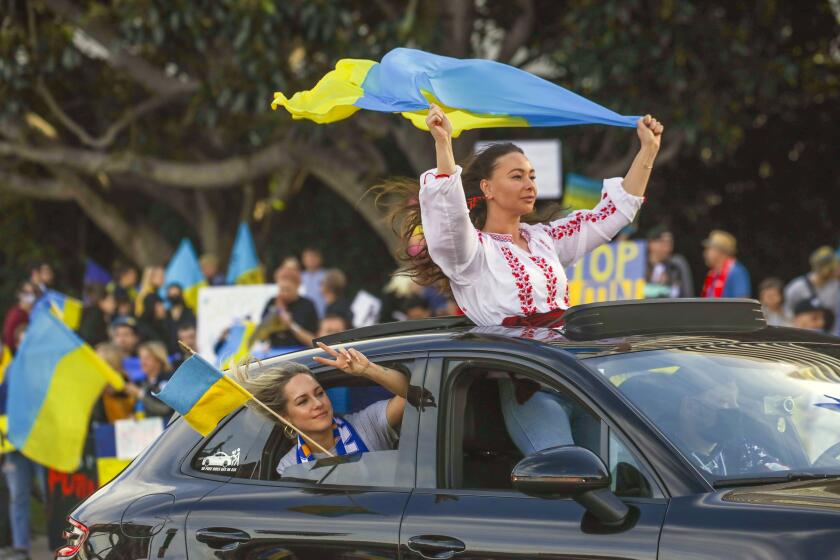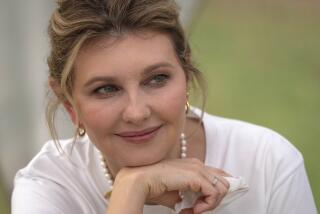‘When there are troubles, we go to God’: Ukrainian Americans gather in grief at L.A. church
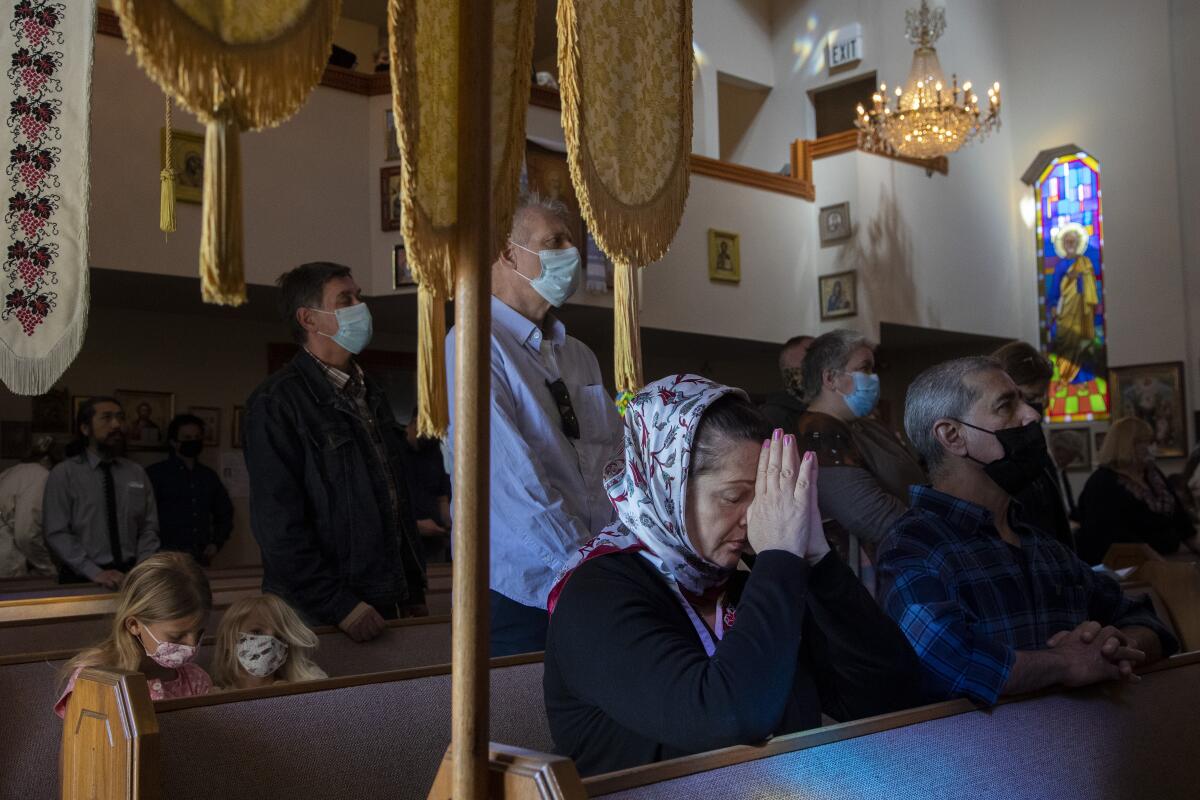
- Share via
Roman Korol stood outside Saint Andrew Ukrainian Orthodox Church in Echo Park on Sunday and fought tears as he thought of his family members in his native Ukraine.
Dressed in a traditional Ukrainian shirt stitched with blue embroidery, the 24-year-old said he felt overwhelmed by the violence that has torn through Ukraine since Russia launched a full-scale invasion of its neighbor on Thursday.
“I’m stressed and sad,” Korol said, wiping his eyes as his wife held their son.
The shirt, he said, was a gift from his grandmother — the kind worn on special occasions. Now he wonders whether his 8-week-old boy will ever meet her.
“It’s heartbreaking to see him go through this,” Karen Korol, 27, said. “His whole family is there.”
Nearly 40 people gathered inside the church Sunday morning and prayed in English and Ukrainian for those killed during Russian President Vladimir Putin’s invasion, as well as the loved ones and compatriots who have stayed in their cities and held their ground in an unprovoked war.
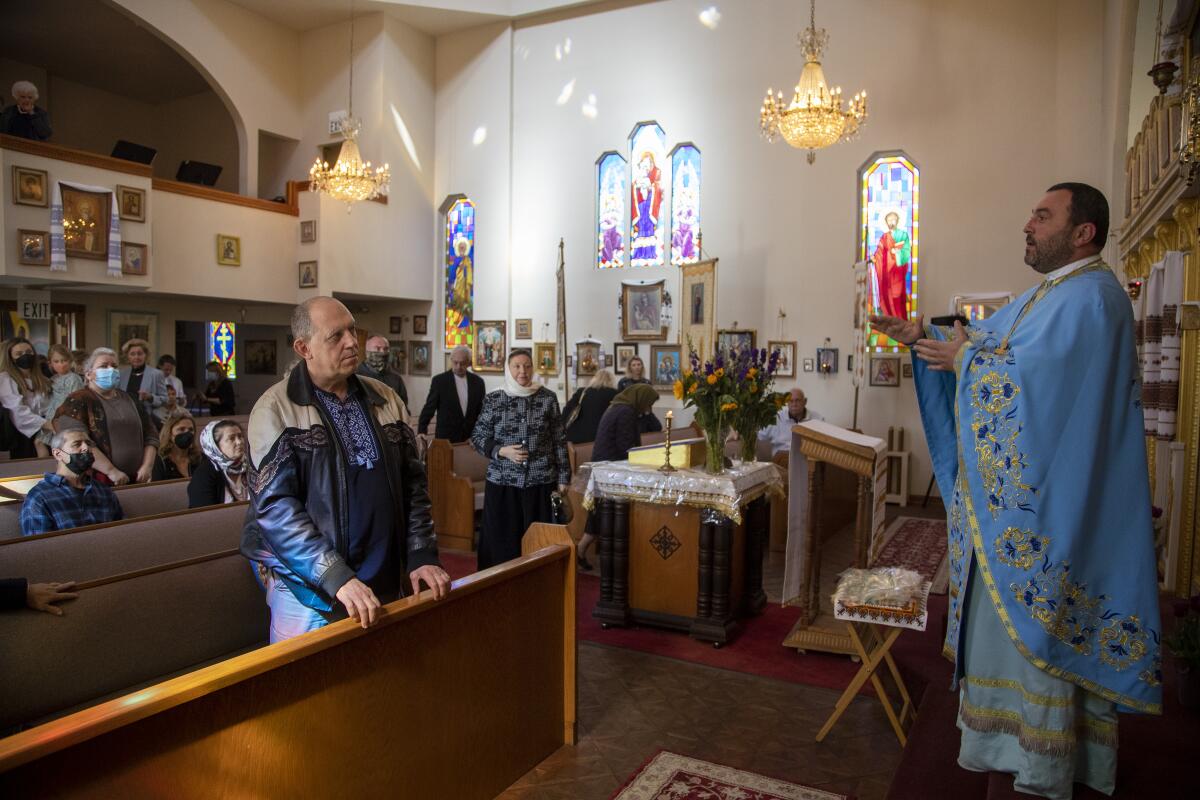
Four days after Putin began his large-scale assault by air, land and sea, tens of thousands of Ukrainians have already fled west, some crossing into Poland and Romania. But thousands more have responded to Ukrainian President Volodymyr Zelensky’s call to take up arms to push back against the Russian blitz in what is Europe’s biggest ground war since World War II.
Protests and vigils are held in Los Angeles, San Francisco, Sacramento and elsewhere in California in response to Russia’s invasion of Ukraine.
Although the Ukrainian diaspora in Southern California is small compared with communities on the East Coast and the Midwest, enclaves across the state keep close ties, community members say. The Golden State is home to roughly 112,000 people of Ukrainian descent, according to U.S. Census Bureau data, many of them clustered in the Bay Area, Los Angeles and Sacramento.
On Sunday, some in the congregation wept as their pastor spoke, the smell of incense hanging thick in the air.
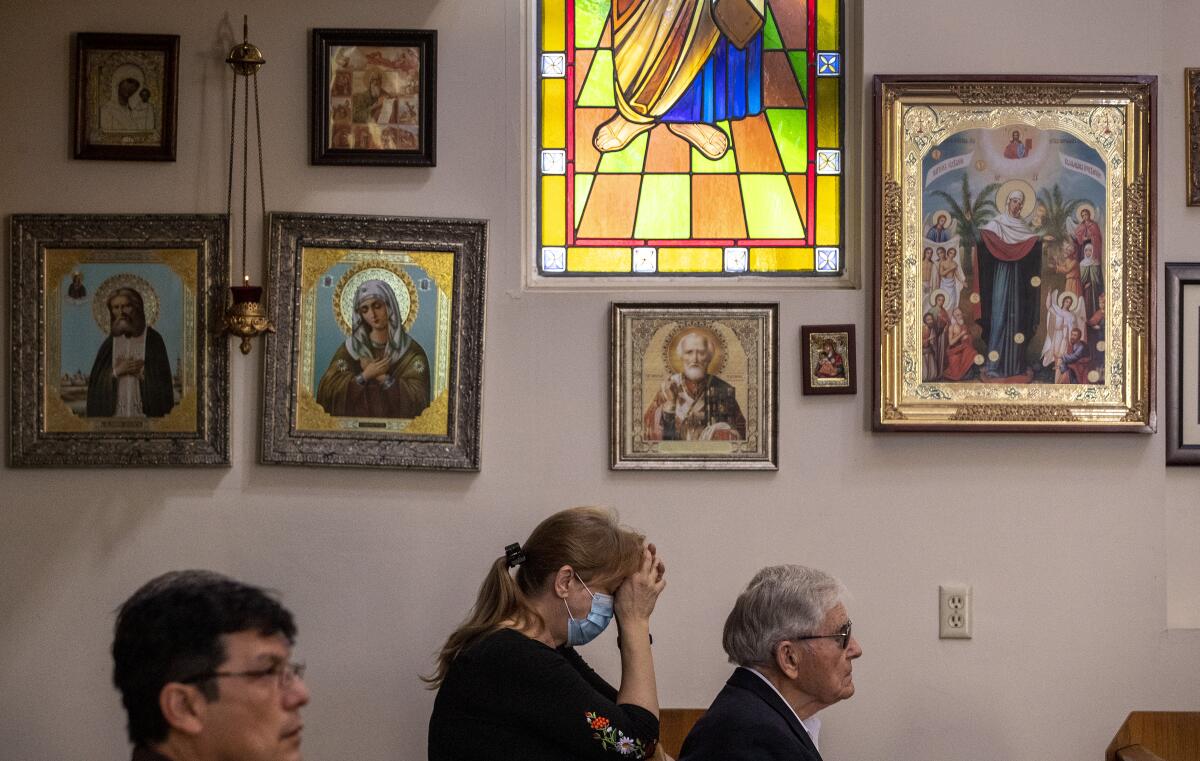
Roman Korol recited a prayer for Ukraine, one that asked for God to protect and bless his home country. As he spoke the third verse, he thought of his family. Tears fell down his cheeks.
“I can’t really do much,” he said. “I am helpless other than spreading the word.”
Roman Slobodynskyj never thought he would see Russia invade a sovereign Ukraine.
“It’s terrible. You can’t define it in any other fashion,” said Slobodynskyj, 82, who moved to the United States when he was 9 years old. “This is the reason our parents fled.”
The service was busier than a normal Sunday prayer, Slobodynskyj said. Cars filled the lot below, some parked in tandem to make room for the larger crowd.
“There’s a saying in Ukrainian: When there are troubles, we go to God,” he said, smiling.
His wife, Maria, said she was happy to pray for Ukraine, but added that it would take “not only prayers, but weapons,” to help.
“I’m grateful our parents aren’t here to see it,” she said. “We’re blessed they won’t have to relive it again. But we have to show our children. We can’t let it go. Let’s hope it ends with this generation.”
At the end of the nearly three-hour service — one that ran longer than usual “because we have a great crisis” — Father Vasile Sauciur delivered an impassioned sermon and questioned Putin’s motives, wondering what goal would be worth the lives lost in war. He rested his fingertips against his temple as he spoke.
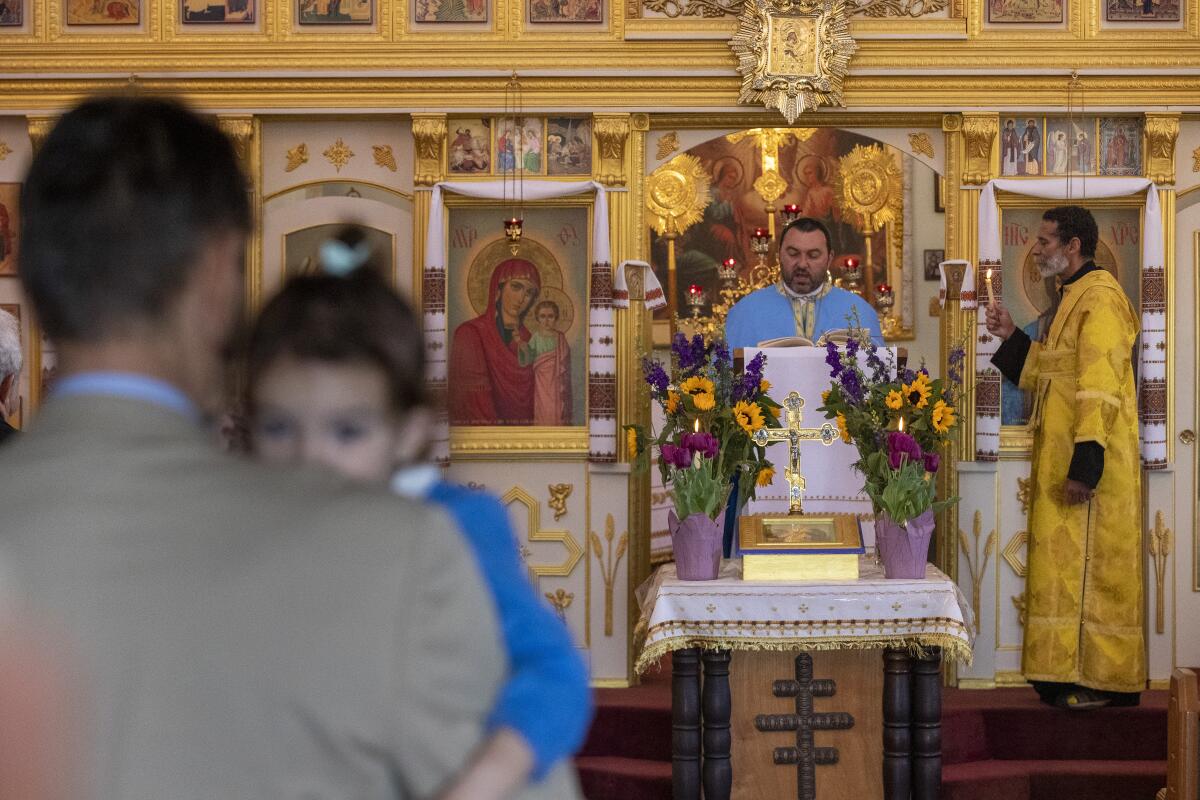
“This is not only about Ukraine. This is about the civilized world,” he said. “Unfortunately, we were left on our own. God is with us, and that is most important.”
The pastor compared Ukraine and Russia to the story of David and Goliath, casting Ukraine as the underdog who, though small, has “the right heart.”
“We have what it takes to be victorious,” Sauciur said, his voice booming.
Outside the church, Yaroslava Skokova sat in the sunlight as the sounds of parishioners chanting prayers flowed out the building.
“We didn’t expect this from Russia,” said Skokova, who left Kyiv, the Ukrainian capital, with her husband in 2017. “I cry every day. I can’t sleep.”
Her cousin, she said, still lives in Kyiv and is now in bomb shelters with her husband and children. The first night of the attack, Skokova said, her cousin slept in a hospital.
“Two women gave birth there,” the 33-year-old said. “Now our children are born in the Metro and in bomb shelters.”
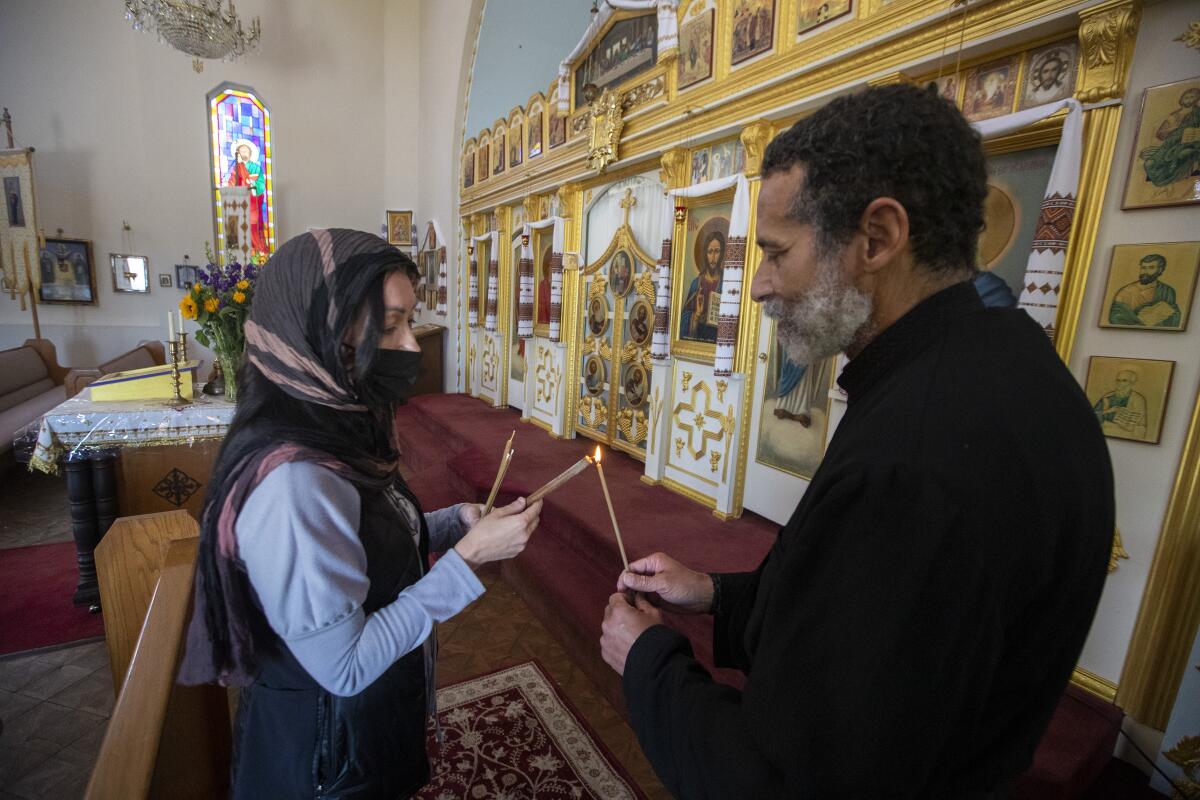
Before prayers, Michael Zlidenny reached for a jar of coffee in the church’s kitchen, his hands shaking slightly as he put several spoons’ worth of grounds into a filter for the parishioners who had yet to arrive.
Zlidenny, who first moved to New York with his family before eventually moving to California, called Ukraine “the breadbasket of Europe” and derided Putin as a madman.
“The only thing we can do is pray,” the 83-year-old said with a quivering voice. “There’s not much we can do. We’re too old to go and fight.”
Paul Micevych, president of the church’s board of administration, said he was still in shock.
“I thought we’re in the 21st century, but dealing with something like this.... This is an 18th or 19th century imperial grab of land,” he said. “Russia is recolonizing Ukraine.”
The son of Ukrainian immigrants, Micevych said Ukrainian identity has always been a central part of his life. He attended Ukrainian school as a child, and has traveled to Ukraine nearly a dozen times — both to visit and to provide aid. Many in the diaspora are “Ukrainian at heart,” he said.
“I’m heartbroken,” Micevych, 68, said. “I have friends there. The younger ones have taken up arms, and they’re doing what they can.”
His friends closer to his age aren’t leaving either, he said. They refuse to leave the land and country they hope remains free.
More to Read
Sign up for Essential California
The most important California stories and recommendations in your inbox every morning.
You may occasionally receive promotional content from the Los Angeles Times.
